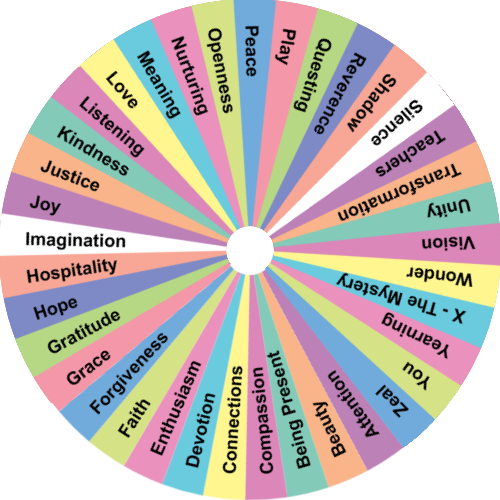Marissa Nadler's For My Crimes
The Spiritual Side
"For My Crimes" is a fluid interplay of Yearning, Shadow, Hope, Love,
Connection, Transformation, Imagination, Lamentation, and Mystery.
Taken as a whole, the album reveals a concrete truth about the spiritual side of life.
Spirituality is an ongoing process of entangled emotions, often dark, arising out of
human life itself, amid our quests for connection and vitality,
intimacy and pleasure, mutuality and love and justice.
The spirit of creative transformation, itself divine,
does not and cannot disentangle the emotions.
But the spirit can help turn their creative energies into harmony and intensity,
into richness of experience, into what Whitehead calls "strength of beauty."
And sometimes a beautiful voice, or an evocative painting,
or a good country song with a metal spin, can help facilitate the process.
For My Crimes:
|
Interlocking:
|
Said Goodbye to that Car: TransformationDream Dream Big in the Sky:
|
The Many Moods and Modes of Spirituality
The Spiritual Alphabet of Frederic and Mary Ann Brussat
The Spiritual Alphabet of Frederic and Mary Ann Brussat
Music as a Spiritual GuidePopular music is a springboard for spirituality in our time. By spirituality I mean the depth dimension of life, including the emotional intelligence that is important to become fully alive and fully human. Spirituality is much more than a journey of belief or practice of the body. It is a journey of the heart. with entangled emotions.
Mary Ann and Frederic Brussat identify thirty-seven moods that are part of this entangled journey. The value of their spiritual alphabet is its wide range and its availability to people of many different religious affiliations and to people without any affiliation. Their alphabet is relevant to believers, non-believers, and the vast majority who are somewhere in between. (See their Alphabet of Spiritual Literacy.) Process theology offers a worldview in terms of which the moods and modes of their alphabet can be understood and appreciated cosmologically. It does to by pointing to a universe that is a vast network of inter-becoming in which all living beings, humans much included, seek harmony and intensity in their lives. And it speaks of the Soul of the universe: that is, an embracing compassion within whose life all lives unfold. This Soul is more than the universe, but the universe is itself the body of this Soul. The cosmic Soul is a lure within the human heart to become fully human in community with people, animals, and the earth. The Soul is itself the Eros toward satisfaction, toward meaning, at the heart of the universe. (See Twenty Key Ideas in Process Thinking.) Popular songs often function as ambassadors for this Soul: that is, as metaphoric “angels” through whom the many moods and modes of spirituality are discovered and explored. (See Popular Songs as Postmodern Angels.) The songs of Marissa Nadler in her recent album – For My Crimes -- provide an example by introducing listeners to many of the moods and modes that are part of the spiritual side of life. Of course, some of these moods and modes are absent as well: justice and joy, for example. Nadler's tone is often dark and her lyrics are about personal relationships, not social well-being. The overall effect of the album, and for that matter of each song, is to remind us that the moods and modes flow into each other and perhaps that no single mood or mode “wins" -- except perhaps the yearning for connection. Life itself is a process, flowing in and out of different moods. The heart of spirituality is to be available to the call of each moment: a call for tears, for honesty, for hope, for love. With Marissa Nadler we do not hope for resolution; we hope for taking a next step in life, given where we’ve been, facing our shadow, laced with humor and imagination, and yearning for intimacy. The yearning is itself an act of hope, amid, not apart from, the entangled emotions. -- J. McDaniel |
Learning about the Moods and Modes with help
from Frederic and Mary Ann Brussat
in Spirituality and Practice
all quotations from the Brussats
|
Transformation
"The spiritual practice of transformation holds within its wide embrace the personal renewals that come with a spiritual awakening, a conversion, a mystical epiphany, or an enlightenment...Transformation usually involves the shedding of old ways, especially those that have become burdens. This practice proclaims that no matter who you are, no matter what has already happened to you, no matter what you have done, it is still possible to be and do something new." -- Frederic and Mary Ann Brussat, Spirituality and Practice Yearning is the force field of desire that draws us to God. It grows out of our sense of incompleteness and our deep need for something more which we know can only be met by The More. It is characterized by a restlessness in our souls. We desperately want to move beyond the petty wants of the ego and break out of the self-constructed prisons that confine us.
Yearning draws out the mystic inside us as we sense the sacred presence in the world and feel one with all that exists. By attending to this desire, we realize that it also fuels our drive for sexual fulfillment. Yearning reveals the sacramental dimensions of erotic love and makes it one of the most enthralling experiences of life." -- Frederic and Mary Ann Brussat, Spirituality and Practice |
Shadow
"The spiritual practice of shadow encourages us to make peace with those parts of ourselves that we find to be despicable, unworthy, and embarrassing — our anger, jealousy, pride, selfishness, violence, and other "evil deeds." In Christianity, shadow aspects show up as the seven deadly sins. Muslims talk about nafs as our lower selves, and Buddhists refer to negative emanations of mind. Societies and cultures also have dark sides. This practice aims at wholeness by unifying the dark and the light inside and around us. Start by looking closely at yourself, especially your flaws. Take responsibility for your actions, especially those that have had unfortunate outcomes. By owning your shadow, you embrace your full humanity. -- Frederic and Mary Ann Brussat, Spirituality and Practice Mystery. To be spiritual is to have an abiding respect for the great mysteries of life — the profound distinctiveness of other souls, the strange beauty of nature and the animal world, the ineffable complexity of our inner selves, the unfathomable depths of the Inexplicable One. The wisdom traditions challenge us to live within a cloud of unknowing. The first step in the practice of mystery is to cherish the baffling, curious, hidden, and inscrutable dimensions of your existence and the world around you. Live with paradoxes. Give up the idea that you can always "get it." Be suspicious of all the "ologies" that try to explain everything — from astrology to psychology to theology. Whenever you are honestly stumped by the existence of evil, injustice, or suffering, resist the temptation to ask "Why?" And never be afraid to admit "I don't know." -- Frederic and Mary Ann Brussat, Spirituality and Practice
|
MARISSA NADLER: CULT MUSICIAN ON TRANSFORMATIVE
NEW GOTH-FOLK FEMINIST ALBUM
"I asked my husband to give me an assignment. He's a writer. And all he said was to write a song about death row. But then very immediately the song became all about my own guilt and the guilt of humanity. And I realized that it was just a very helpful writing exercise, but then I realized this is a universal theme. No one is 100 percent good … It's tough to talk about a personal record like this … I mean it doesn't take a brain surgeon to figure out that there is some strife in my life." (Marissa Nadler in interview with Emma Madden in Revolver, Sept. 28, 2018) |
"Nadler's approach is to fixate on the thing causing her most pain, and her music asks us to do the same, until there's nothing but hope left at the end. It's why journalists often use words like "ghostly" and "ethereal" to describe her, as though she's untouchable, inscrutable, unreachable. In that way, they avoid what she really is, the same way they evade sadness. But in truth, Marissa Nadler is crushingly real, and her latest offering For My Crimes — a diatribe on toxic relationships — is her realest and most hopeful yet." (Emma Madden preceding interview with Marissa Nadler) |





